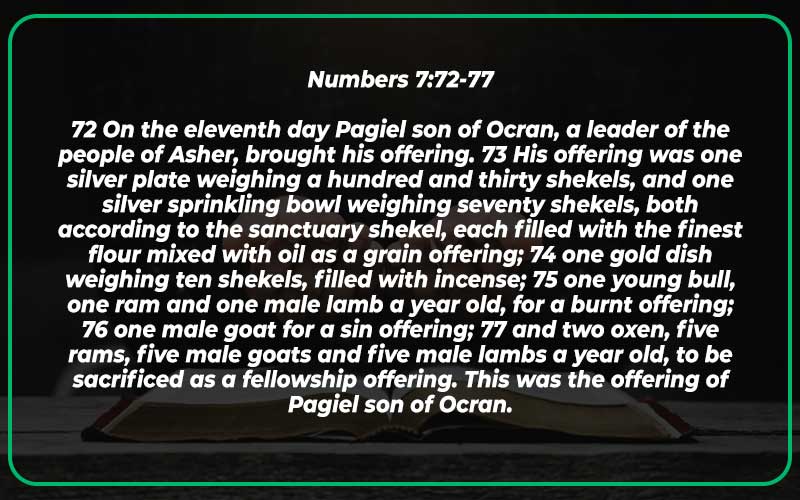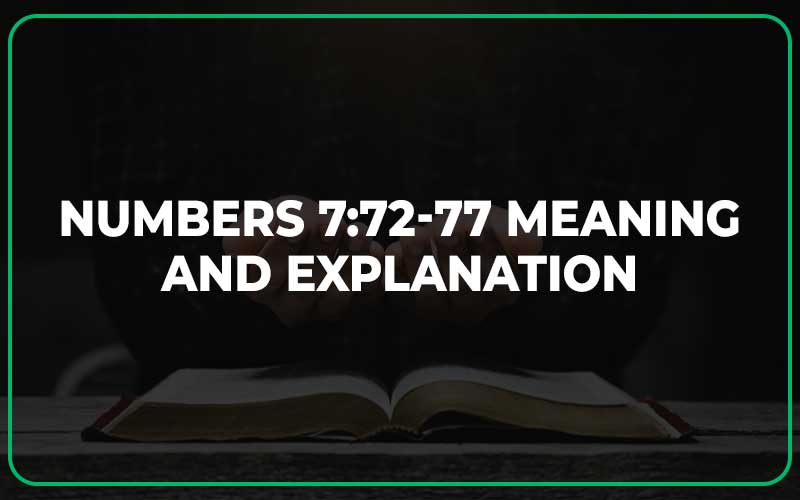Numbers 7:72-77
72 On the eleventh day Pagiel son of Ocran, a leader of the people of Asher, brought his offering. 73 His offering was one silver plate weighing a hundred and thirty shekels, and one silver sprinkling bowl weighing seventy shekels, both according to the sanctuary shekel, each filled with the finest flour mixed with oil as a grain offering; 74 one gold dish weighing ten shekels, filled with incense; 75 one young bull, one ram and one male lamb a year old, for a burnt offering; 76 one male goat for a sin offering; 77 and two oxen, five rams, five male goats and five male lambs a year old, to be sacrificed as a fellowship offering. This was the offering of Pagiel son of Ocran.
What Does Numbers 7:72-77 Mean?
Numbers 7:72-77 describes the offering brought by Pagiel, the leader of the people of Asher, on the eleventh day of the dedication of the tabernacle. The offering consisted of various precious metals and animals to be sacrificed as burnt offerings, sin offerings, and fellowship offerings.
The purpose of these offerings was to approach God in worship, express gratitude, seek forgiveness, and establish a covenant relationship with Him.
Explanation and Commentary of Numbers 7:72-77
The offering brought by Pagiel reflects his commitment, devotion, and obedience to God.
As a leader, he sets an example for the people of Asher to follow in honoring and worshiping God. The specific items in the offering, such as silver plates, sprinkling bowls, gold dishes, and incense, were used in the tabernacle for various ceremonial purposes.
The animals offered, including bulls, rams, male goats, and male lambs, symbolize the different types of atonement and fellowship required by the law of Moses. The burnt offerings were completely consumed by fire, representing surrender and dedication to God.
The sin offerings were meant to cleanse the people from their sins and restore their relationship with God. The fellowship offerings were a way to express thanksgiving and to enjoy a communal meal in the presence of God.

Context of Numbers 7:72-77
The book of Numbers is the fourth book in the Old Testament and recounts the events that took place as the Israelites traveled through the wilderness. In Numbers 7, Moses consecrated the tabernacle, and each leader of the twelve tribes presented offerings on consecutive days.
This chapter emphasizes the unity and equality among the tribes in their worship, as each leader brought the same offering.
Numbers 7:72-77 is part of a longer passage detailing the offerings brought by each tribe on their designated day. This section serves as a historical record to demonstrate the dedication of the leaders and their obedience to God’s commandments regarding worship in the tabernacle.
Breaking Down the Key Parts of Numbers 7:72-77
Verse 72: “On the eleventh day Pagiel son of Ocran, a leader of the people of Asher, brought his offering.”
Pagiel, as a leader of the tribe of Asher, faithfully presented his offering according to the prescribed time and order set by God.
Verses 73-74: “His offering was one silver plate weighing a hundred and thirty shekels, and one silver sprinkling bowl weighing seventy shekels, both according to the sanctuary shekel, each filled with the finest flour mixed with oil as a grain offering; one gold dish weighing ten shekels, filled with incense.”
Pagiel’s offerings included special vessels made of precious metals filled with offerings of fine flour mixed with oil and incense. These objects and ingredients symbolize the holiness and purity required in approaching God.
Verses 75-76: “One young bull, one ram and one male lamb a year old, for a burnt offering; one male goat for a sin offering.”
Pagiel offered various animals as burnt and sin offerings. The specific animals represented different aspects of worship and seeking forgiveness for sins committed unintentionally.
Verse 77: “And two oxen, five rams, five male goats and five male lambs a year old, to be sacrificed as a fellowship offering. This was the offering of Pagiel son of Ocran.”
Pagiel also offered animals for fellowship offerings, demonstrating his desire to commune with God and celebrate His goodness and faithfulness.
Bible Study on Numbers 7:72-77
Numbers 7:72-77 provides valuable insights into the worship practices of ancient Israel and the importance of bringing offerings to God to acknowledge His sovereignty and seek forgiveness for sins. It teaches us the value of obedience, devotion, and gratitude in our relationship with God.
It is important to note that these offerings were part of the Mosaic law and were fulfilled through the ultimate sacrifice of Jesus Christ on the cross. As Christians, we are no longer required to bring physical animal sacrifices.
However, the principles of surrender, repentance, and gratitude are still relevant in our worship. We can offer ourselves as living sacrifices (Romans 12:1), confess our sins to God and receive forgiveness through Jesus (1 John 1:9), and express our thanksgiving and fellowship with God and fellow believers (Hebrews 13:15-16).
Also Read: Joel 2:15-17 Meaning and Explanation
Biblical Translations of Numbers 7:72-77
New International Version (NIV):
On the eleventh day Pagiel son of Ocran, a leader of the people of Asher, brought his offering. His offering was one silver plate weighing a hundred and thirty shekels and one silver sprinkling bowl weighing seventy shekels, both according to the sanctuary shekel, each filled with the finest flour mixed with olive oil as a grain offering; one gold dish weighing ten shekels, filled with incense; one young bull, one ram, and one male lamb a year old, for a burnt offering; one male goat for a sin offering; and two oxen, five rams, five male goats, and five male lambs a year old, to be sacrificed as a fellowship offering. This was the offering of Pagiel son of Ocran.
King James Version (KJV):
On the eleventh day Pagiel the son of Ocran, prince of the children of Asher, offered: His offering was one silver charger, the weight whereof was an hundred and thirty shekels, one silver bowl of seventy shekels, after the shekel of the sanctuary; both of them full of fine flour mingled with oil for a meat offering: One spoon of gold of ten shekels, full of incense: One young bullock, one ram, one lamb of the first year, for a burnt offering: One kid of the goats for a sin offering: And for a sacrifice of peace offerings, two oxen, five rams, five he goats, five lambs of the first year: this was the offering of Pagiel the son of Ocran.
English Standard Version (ESV):
On the eleventh day Pagiel the son of Ocran, the chief of the people of Asher: his offering was one silver plate whose weight was 130 shekels, one silver basin of 70 shekels, according to the shekel of the sanctuary, both of them full of fine flour mixed with oil for a grain offering; one golden dish of 10 shekels, full of incense; one bull from the herd, one ram, one male lamb a year old, for a burnt offering; one male goat for a sin offering; and for the sacrifice of peace offerings, two oxen, five rams, five male goats, and five male lambs a year old. This was the offering of Pagiel the son of Ocran.
New Living Translation (NLT):
On the eleventh day Pagiel, son of Ocran, leader of the tribe of Asher, presented his offering. It was one silver platter weighing 3-4 pounds (1.5 kilograms) and one silver basin weighing 1^ 3/4 pounds (0.8 kilograms), as measured by the weight of the sanctuary shekel. These were both filled with grain offerings of choice flour moistened with olive oil. He also brought one gold container weighing 3/4 pound (340 grams), which was filled with incense. Pagiel brought one young bull, one ram, and one male lamb a year old, for a burnt offering. Pagiel also brought one male goat for a sin offering. For his peace offering, he brought two bulls, five rams, five male goats, and five one-year-old male lambs. This was the offering brought by Pagiel son of Ocran.
New King James Version (NKJV):
On the eleventh day Pagiel the son of Ocran, leader of the children of Asher, presented an offering. He presented one silver plate weighing one hundred and thirty shekels and one silver bowl of seventy shekels, according to the shekel of the sanctuary, both of them full of fine flour mixed with oil as a grain offering; one gold pan of ten shekels, full of incense; one young bull, one ram, and one male lamb in its first year, as a burnt offering; one kid of the goats as a sin offering; and as a sacrifice of peace offerings: two oxen, five rams, five male goats, and five male lambs in their first year. This was the offering of Pagiel the son of Ocran.
Amplified Bible (AMP):
On the eleventh day Pagiel the son of Ochran, leader of the sons of Asher, presented his offering. His offering was one silver dish of the weight of a hundred and thirty shekels, and one silver basin of the weight of seventy shekels, according to the sanctuary shekel, both of them filled with fine flour mixed with oil as a grain offering; one gold pan of ten shekels, filled with incense; one young bull, one ram, one male lamb one year old, for a burnt offering; one male goat for a sin offering; and for the sacrifice of peace offerings, two oxen, five rams, five male goats, and five male lambs one year old. This was the offering of Pagiel the son of Ochran.
Christian Standard Bible (CSB):
On the eleventh day Pagiel son of Ocran, leader of the Asherite tribe, presented an offering. He offered one silver dish weighing 130 shekels and one silver basin weighing 70 shekels, according to the sanctuary shekel, both filled with fine flour mixed with oil for a grain offering; one gold dish weighing ten shekels, filled with incense; one young bull, one ram, and one male lamb a year old, for a burnt offering; one male goat for a sin offering; and for the fellowship offering: two bulls, five rams, five male goats, and five male lambs a year old. This was the offering of Pagiel son of Ocran.
Final Thoughts
Numbers 7:72-77 highlights the significance of offerings in the worship of ancient Israel. It reminds us of the importance of obedience, devotion, and gratitude to God in our worship today.
As Christians, we have the privilege of approaching God through the finished work of Jesus Christ, who is the ultimate sacrifice for our sins.
May we always remember to offer ourselves to Him in surrender, seek His forgiveness, and express our gratitude and fellowship with Him.

